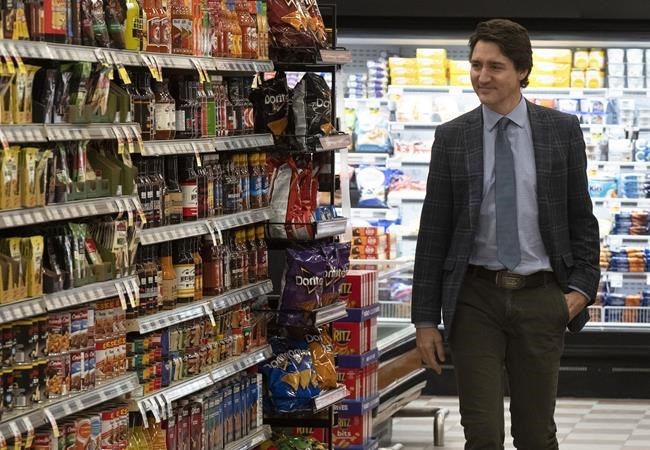OTTAWA — Major grocers in Canada are not yet confirming whether they have committed to special promotions to stabilize grocery prices, as was recently promised by the federal government.
Industry Minister François-Philippe Champagne announced last week that the grocers have presented initial plans to stabilize prices, which include discounts, price freezes and price-matching campaigns.
The Canadian Press has reached out to the grocers — Loblaw, Empire, Metro, Walmart and Costco — to confirm what exactly each of them has promised to do.
Metro declined to comment, while Loblaw, Empire and Costco have not responded to requests for information.
In a written response, a spokeswoman for Walmart Canada said the company plans to keep offering "every day low prices," which refers to Walmart's strategy of offering low prices on a regular basis, rather than on promotion only.
"Last week, we shared with the government how we will continue to deliver every day low prices for Canadians during these challenging times," said Stephanie Fusco, senior manager of corporate affairs.
"We're taking action to fight inflation and keep prices low and, in our submission, also provided several suggestions on the role government and regulators can play in curtailing food price inflation for Canadians."
The federal government gave an ultimatum to grocers in September, saying they should present plans to stabilize grocery prices by Thanksgiving or face potential tax measures as a consequence.
The move came in response to the pressure Canadian families are facing as grocery prices continue to rapidly climb. Grocery prices in August were 6.9 per cent higher than they were a year ago. Meanwhile, the country's overall inflation rate was 4.0 per cent.
Recent polls show support for the governing Liberals dropping as affordability remains top-of-mind for voters.
Champagne's announcement last week on the commitments from grocers included little detail. The minister did not provide clarify whatproducts may be subject to special promotions, for example.
When pressed by reporters on how Canadians will know these promotions are any different than the ones regularly offered by grocers, Champagne said he does not want to disclose what each company has pledged to do.
"I'm saying those are examples of what we see in the plans, because I want the market to compete. I cannot say I received that from Loblaws, I received that from Metro, I received that from Costco, I received that from Walmart," he said on Thursday.
"Each grocer has different actions. So it will be up to Canadians to judge them."
NDP Leader Jagmeet Singh slammed the Liberals' approach on grocery prices during a news conference last week, saying their "plan to ask CEOs nicely to reduce prices is ridiculous."
The industry minister has repeatedly pointed to other countries, such as France and the U.K., as examples for grocers to follow, as countries around the world have struggled with skyrocketing food prices.
In August, the annual rate of food inflation was 13.6 per cent in the United Kingdom and 9.8 per cent in the eurozone.
The French government reached a three-month agreement with supermarket chains earlier this year for them to cut prices on hundreds of staples and other foods, which is expected to be extended through the summer.
In the U.K., grocery giant Asda announced in June its plans to freeze prices on 500 products until the end of August.
Other European countries have mandated price controls for staple foods. Hungary, for example, put price caps in place last year for products such as eggs and potatoes.
This report by The Canadian Press was first published Oct. 11, 2023.
— With files from the Associated Press.
Nojoud Al Mallees, The Canadian Press



